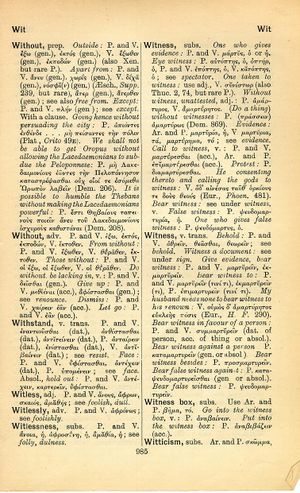without: Difference between revisions
οὐ σμικρὸν παραλλάττει οὕτως ἔχον ἢ ἄλλως → it makes no small difference if it's this way, or another way
(Woodhouse 5) |
(CSV5) |
||
| Line 1: | Line 1: | ||
{{ | {{Woodhouse1 | ||
| | |Text=[[File:woodhouse_985.jpg|thumb|link={{filepath:woodhouse_985.jpg}}]]'''prep.''' | ||
<b class="b2">Outside</b>: P. and V. [[ἔξω]] (gen.), [[ἐκτός]] (gen.), V. [[ἔξωθεν]] (gen.). [[ἐκποδών]] (gen.) (also Xen. but rare P.). | |||
<b class="b2">Apart from</b>: P. and V. [[ἄνευ]] (gen.), [[χωρίς]] (gen.), V. [[δίχα]] (gen.), [[νόσφι]](ν) (gen.) (Aesch., ''Supp.'' 239, but rare), [[ἄτερ]] (gen.), ἄτερθεν (gen.); see also [[free from]]. | |||
<b class="b2">Except</b>: P. and V. [[πλήν]] (gen.); see [[except]]. | |||
With a clause. <b class="b2">Going hence without persuading the city</b>: P. ἀπιόντες [[ἐνθένδε]]... μὴ πείσανπες τὴν πόλιν (Plat., <b class="b2">Crito 4</b>9E). | |||
<b class="b2">We shall not be able to get Oropus without allowing the Lacedaemonians to subdue the Peloponnese</b>: P. μὴ Λακεδαιμονίους ἐῶντες τὴν Πελοπόννησον καταστρέψασθαι οὐχ οἷοί τε ἐσόμεθα <b class="b2">Ὠ</b>ρωπὸν λαβεῖν (Dem. 206). | |||
<b class="b2">It is possible to humble the Thebans without making the Lacedaemonians powerful</b>: P. ἔστι Θηβαίους ταπεινοὺς ποιεῖν [[ἄνευ]] τοῦ Λακεδαιμονίους ἰσχυροὺς καθιστάναι (Dem. 208). | |||
'''adv.''' | |||
P. and V. [[ἔξω]], [[ἐκτός]], [[ἐκποδών]], V. [[ἔκτοθεν]]. | |||
<b class="b2">From without</b>: P. and V. [[ἔξωθεν]], V. [[θύραθεν]], [[ἔκτοθεν]]. | |||
<b class="b2">Those without</b>: P. and V. οἱ [[ἔξω]], οἱ [[ἔξωθεν]], V. οἱ [[θύραθεν]]. | |||
<b class="b2">Do without be lacking in</b>, v.: P. and V. δεῖσθαι (gen.). | |||
<b class="b2">Give up</b>: P. and V. μεθιέναι (acc.), ἀφίστασθαι (gen.); see [[renounce]]. | |||
<b class="b2">Dismiss</b>: P. and V. [[χαίρω|χαίρειν]] ἐᾶν (acc.). | |||
<b class="b2">Let go</b>: P. and V. ἐᾶν (acc.). | |||
}} | }} | ||
Revision as of 10:09, 21 July 2017
English > Greek (Woodhouse)
prep.
Outside: P. and V. ἔξω (gen.), ἐκτός (gen.), V. ἔξωθεν (gen.). ἐκποδών (gen.) (also Xen. but rare P.).
Apart from: P. and V. ἄνευ (gen.), χωρίς (gen.), V. δίχα (gen.), νόσφι(ν) (gen.) (Aesch., Supp. 239, but rare), ἄτερ (gen.), ἄτερθεν (gen.); see also free from.
Except: P. and V. πλήν (gen.); see except.
With a clause. Going hence without persuading the city: P. ἀπιόντες ἐνθένδε... μὴ πείσανπες τὴν πόλιν (Plat., Crito 49E).
We shall not be able to get Oropus without allowing the Lacedaemonians to subdue the Peloponnese: P. μὴ Λακεδαιμονίους ἐῶντες τὴν Πελοπόννησον καταστρέψασθαι οὐχ οἷοί τε ἐσόμεθα Ὠρωπὸν λαβεῖν (Dem. 206).
It is possible to humble the Thebans without making the Lacedaemonians powerful: P. ἔστι Θηβαίους ταπεινοὺς ποιεῖν ἄνευ τοῦ Λακεδαιμονίους ἰσχυροὺς καθιστάναι (Dem. 208).
adv.
P. and V. ἔξω, ἐκτός, ἐκποδών, V. ἔκτοθεν.
From without: P. and V. ἔξωθεν, V. θύραθεν, ἔκτοθεν.
Those without: P. and V. οἱ ἔξω, οἱ ἔξωθεν, V. οἱ θύραθεν.
Do without be lacking in, v.: P. and V. δεῖσθαι (gen.).
Give up: P. and V. μεθιέναι (acc.), ἀφίστασθαι (gen.); see renounce.
Dismiss: P. and V. χαίρειν ἐᾶν (acc.).
Let go: P. and V. ἐᾶν (acc.).

